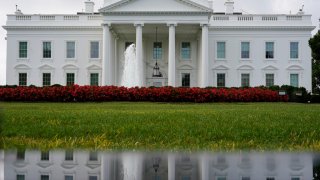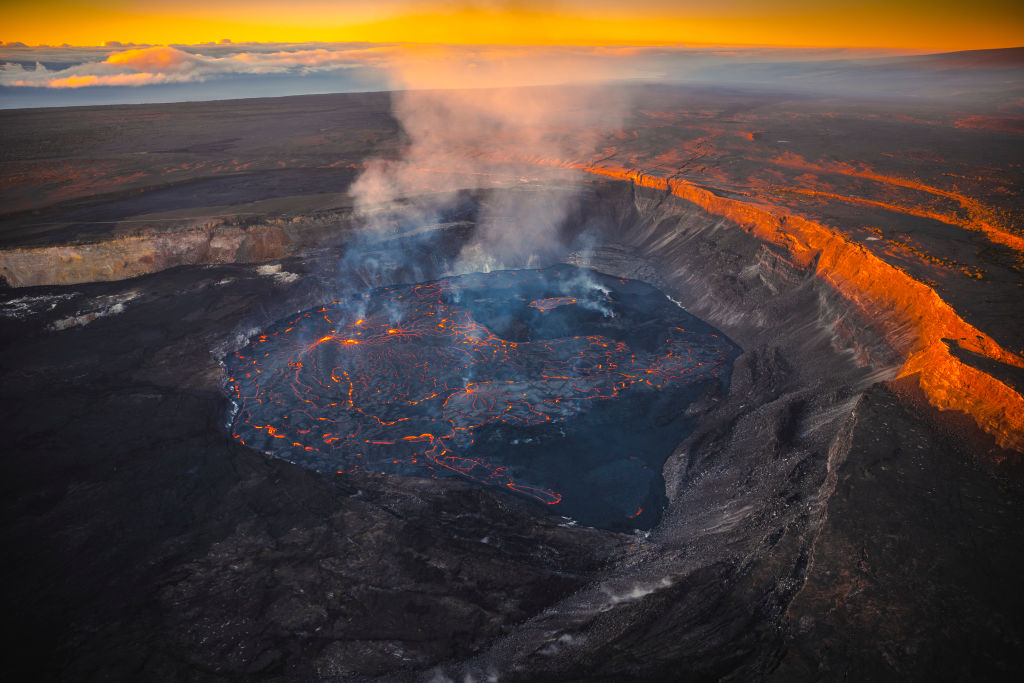
In a politically polarized nation, Americans seem to agree on one issue underlying the 2024 elections — a worry over the state of democracy and how the outcome of the presidential contest will affect its future.
They just disagree over who poses the threat.
A poll from The Associated Press-NORC Center for Public Affairs Research found that 62% of adults say democracy in the U.S. could be at risk depending on who wins next fall. Majorities of Democrats (72%) and Republicans (55%) feel the same way, but for different reasons.
President Joe Biden has attempted to paint a dystopian future if GOP front-runner and former President Donald Trump returns to the White House after promising to seek retribution against opponents and declining to rule out that he would abuse the powers of the office. The former president has tried to flip the narrative lately, saying the election subversion and documents cases against him show Biden has weaponized the federal government to prosecute a political opponent. He has called Biden the “destroyer of American democracy.”
Get Tri-state area news delivered to your inbox.> Sign up for NBC New York's News Headlines newsletter.
“I think from the side of the left, it’s pretty obvious that they’re concerned about electing a president who is avowedly authoritarian, someone who clearly wants to reduce checks and balances within the government to strengthen the presidency and to do so in ways that give the executive branch kind of an unprecedented reach across the population and sectors of the government," said Michael Albertus, political science professor at the University of Chicago.
“From the right, the Republicans think about government overreach, big government, threats to freedom and mandates to act in a certain way or adopt certain policies,” he said.
U.S. & World
Against that backdrop, the poll found that about half of U.S. adults, 51%, say democracy is working “not too well” or “not well at all.”
The poll asked about the importance of the coming presidential election for 12 issues and found that the percentage who said the outcome will be very or extremely important to the future of democracy in the U.S. (67%) ranked behind only the economy (75%). It was about equal to the percentage who said that about government spending (67%) and immigration (66%).
Tony Motes, a retired firefighter who lives in Monroe, Georgia, cited a number of reasons he believes “we’re not living in a complete democracy." That includes what he sees as a deterioration of rights, including parental rights, thieves and other criminals not being held accountable, and a lack of secure borders.
The 59-year-old Republican also said the various criminal cases being brought against Trump undermine the country's democratic traditions.
“They're trying to keep him from running because they know he's going to win,” he said.
The poll's findings continue a trend of Americans' lackluster views about how democracy is functioning. They also believe the country's governing system is not working well to reflect their interests on issues ranging from immigration to abortion to the economy.
Robert Lieberman, a professor of political science at Johns Hopkins University, has studied the fall of democracies elsewhere and the common elements that feed their demise.
The factors include polarization, growing ethnic or racial antagonism, rising economic inequality and a concentration of power under a country's executive officeholder.
“For a number of years now, the United States has had all four of these conditions, really for the first time in history,” he said. “So we're in a period that's ripe for challenges to democracy.”
Trump is not the cause of the pattern, Lieberman said, but “seems to have an unerring instinct to make things worse, and he certainly has authoritarian impulses and a lot of followers who seem to validate or applaud him.”
The AP-NORC poll found that 87% of Democrats and 54% of independents believe a second Trump term would negatively affect U.S. democracy. For Republicans, 82% believe democracy would be weakened by another Biden win, with 56% of independents agreeing.
About 2 in 10 U.S. adults (19%) say democracy in the U.S. is “already so seriously broken that it doesn’t matter who wins the 2024 presidential election.” Republicans (23%) are more likely than Democrats (10%) to say this, but relatively few in either party think U.S. democracy is resilient enough to withstand the outcome.
Social media platforms and news sites that reinforce biases accelerate the polarization that leads people from different political perspectives to believe the other side is the one representing the gravest threat to the nation's democracy, said Lilliana Mason, an associate professor of political science at Johns Hopkins.
“I don’t think that people are exaggerating. I think it’s that they actually are living in information environments in which it is true for them that democracy is under threat,” she said.
Mason said one side fears what Trump has said he will do if he wins, while the other is responding to the fear created in a media ecosystem that says the Democrats want to destroy America and turn it into a socialist or communist society.
For some, the danger is more than Trump’s statements and concern over how he might turn toward authoritarianism. It also is what's happening in the states and courts, where political gerrymandering and threats to voting rights are continuing, as are measures that limit people’s ability to vote easily, such as reducing drop box locations for mail-in ballots and tightening voter identification requirements.
"Look at all the roadblocks that have been put up to keep people, especially people of color, from being able to vote," said Pamela Williams, 75, of New York City, who identifies as a Democrat. "That isn’t democracy.”
Douglas Kucmerowski, 67, an independent who lives in the Finger Lakes region of New York, is concerned over those state-level actions and the continued use of the Electoral College, which can allow someone to be president even if they lose the popular vote.
He also questions the state of the nation's democracy when a large proportion of the country supports a candidate facing multiple criminal charges who has spoken about pursuing retribution and using the military domestically, among other things.
Trump also has lied about the outcome of the 2020 election, which has been affirmed by multiple reviews in the battleground states where he disputed his loss, and called his supporters to a Washington rally before they stormed the U.S. Capitol on Jan. 6, 2021, in a violent attempt to stop Congress from certifying Joe Biden's win.
“That candidate, in any other age, probably would have been ruled out. But for some reason, in this society, he's one of the best choices,” Kucmerowski said. “If this country is that confused that they can't tell the difference between right and wrong and ex-presidents making statements that on day one he will be a dictator, doesn't anybody care about day two or three or four when he's still a dictator?”
___
The poll of 1,074 adults was conducted Nov. 30 through Dec. 4, 2023, using a sample drawn from NORC’s probability-based AmeriSpeak Panel, which is designed to be representative of the U.S. population. The margin of sampling error for all respondents is plus or minus 4.0 percentage points.
___
The Associated Press receives support from several private foundations to enhance its explanatory coverage of elections and democracy. See more about AP’s democracy initiative here. The AP is solely responsible for all content.



